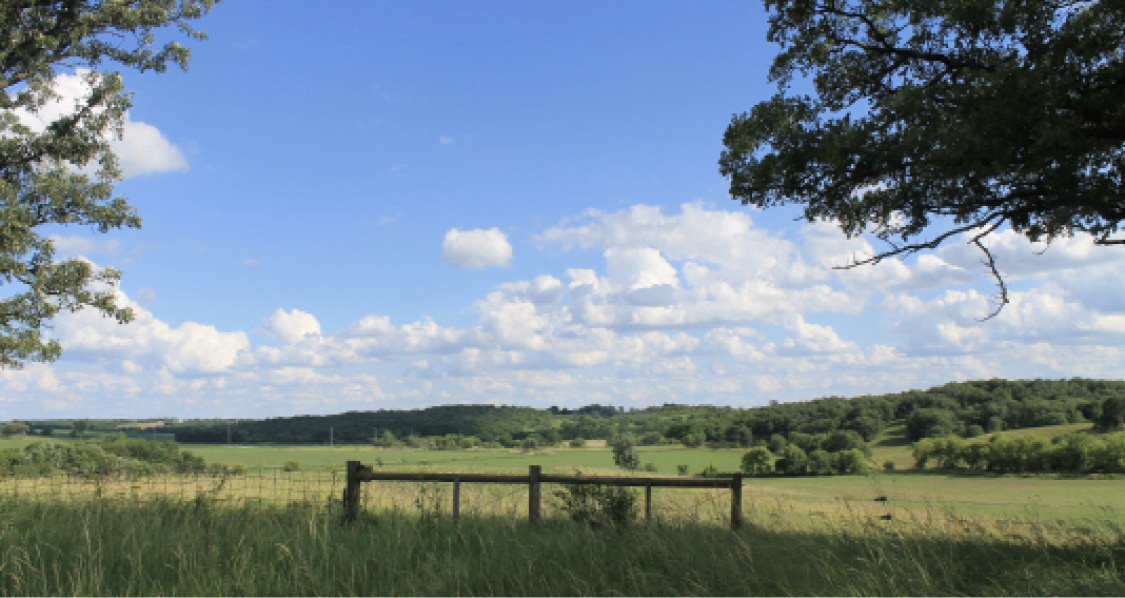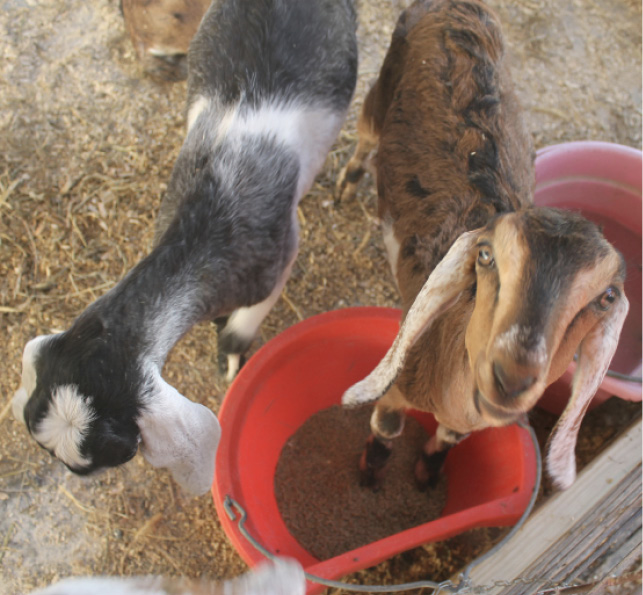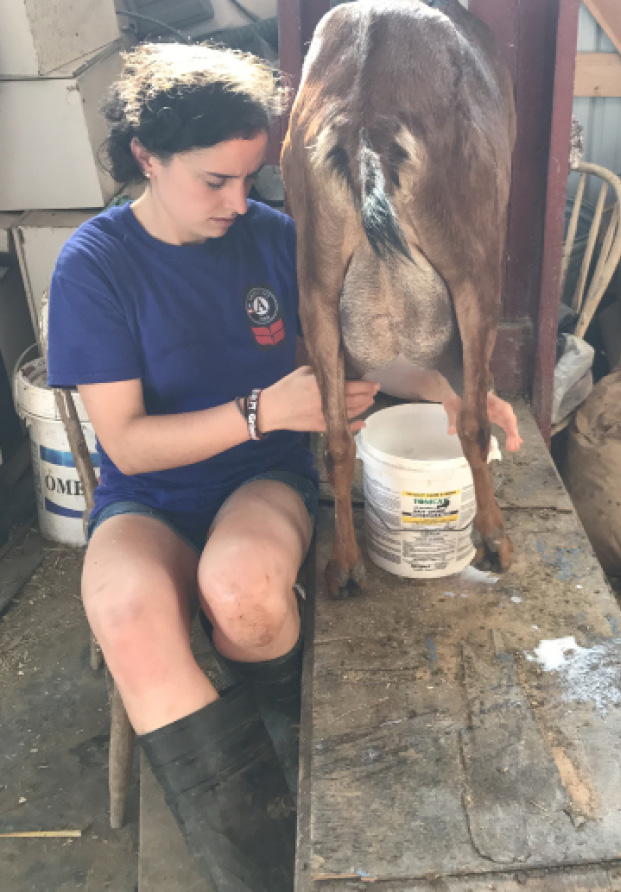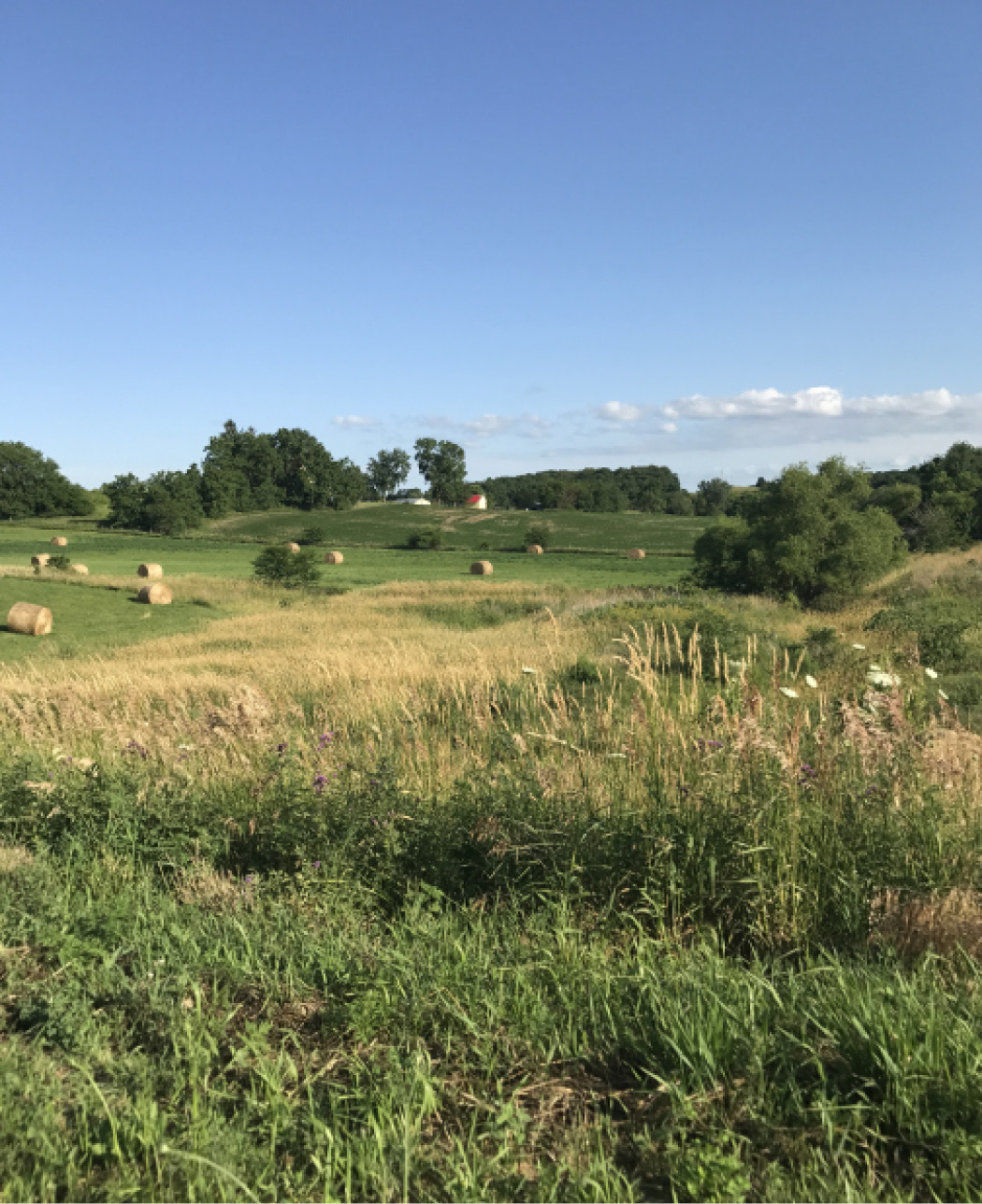For two weeks this past summer, I had a farm of my very own. This is the story of what those weeks were like for me: my everyday routine, its trials, and my growth. A family that I babysit for in the small town of Grinnell, Iowa, went away on vacation for two weeks and asked me to take care of their house while they were gone. It’s on a hill outside of town that includes acres of land in the back, a small barn with goats, dogs and cats, and a chicken coop. Chores such as milking the goats at 5 a.m. required that I live there and use their car to commute to my full-time job. In addition to being paid, I was allowed to use their kitchen, their bed, and utilities. As a bonus, I got a glimpse into what life on a small Midwestern farm is like.
These surroundings were quite different from what I had known from the suburban streets of my hometown, San Jose, California. My backyard at home is relatively large for its neighborhood. It covers two of the house’s four sides; the third faces the front yard, and the final serves as a passageway from one yard to another. I’d always thought of myself as fortunate to be able to be outside with grass, a garden, and a play structure. But if I had grown up with the farm’s 115 acres, I would have felt like a king in his spread of the world. Whole days would have been filled up by the scenes I discovered there: a stream with a steep bank, woodland areas, and of course the tall grasses of the meadows. There was an open hill on the property from which I could see the house as a tiny box from afar. From one spot in the fence line, I could even look between two framing oak trees, across the highway and straight across miles of open countryside.
In standout moments I could imagine my friends from home calling me a farm girl, had they been able to see what I was doing. The first time this happened was on the second day I was there, in the backyard. I was exploring the grounds with Herb, one of the family’s three Anatolian Shepherd dogs (the others were Peaches and Rosie). As I explored the variety of unknown weeds and wildlife, Herb was sometimes leading and sometimes following, sometimes going off on his own, but always returning, even when I thought he had gone too far and wouldn’t be able to find me. I ran with Herb through a hill of prairie grass—literally frolicking. I had always wanted to frolic through rolling green hills, “Sound of Music” style, but I had never realized how enjoyable it would be to push back grass taller than myself, or to leap through it like I was wading in the tide. Here, with Herb’s tonguey smile beside me as we ran, I thought of how fun and different it might have been to grow up in this place instead of in California.
Though I may have been more entertained in this alternate upbringing, I would also have taken more hits from nature. While I was exploring the massive space, I was wearing a skirt, not pants. The vegetation, while fun to explore in parts, also scraped me up pretty well with thorns, spikes, sticks and brambles, and spotted me with bites from mosquitoes and other mystery insects. Navigating got frustrating and tiresome, especially when I was hungry and still a good fifteen minutes out from the house without a clear notion of how to get there. When I finally got back, my camera was covered in dust and my legs in red blotches and marks.
A second farm-girl moment materialized in the kitchen. The kitchen was where I spent most of my waking hours, taking advantage of having the whole place to myself to cook meals, try new things, mess it all up and clean it when I got around to it. Cooking dinner one night, I realized that it was the first time that I had ever constructed a meal off of such intimately local ingredients. The only things I had bought were the vegetables. The eggs, the milk, and the bread that I had baked had all come from the farm. It was a learning moment not only of taste, but also of economics. I was proud that I had saved the money that would have gone into store-bought proteins and grains, but I was also aware, on a personal level, of the self-sufficiency that farming makes possible. I could visualize a lifestyle sustained not by monetary currency, but by the fruits of investing in land and livestock, as humans had done for thousands of years.
Caring for the animals was a growing experience, putting me in the mind of the “I’ll Make a Man Out of You” training sequence from the Disney movie Mulan—except that I wouldn’t say that I overcame anyone in the end to become an expert in the field of milk-maidery. The morning and afternoon milkings were a tussle at first, with the goats stamping in irritation as I tried to adjust my technique. Milking one teat at a time was easier for me because I could hold on to the bucket, but milking both in a rhythm went faster and seemed to be more pleasant for the goats. One of the goats, Dolly, only produced milk in one udder and she would kick and make a fuss before I even touched her. Of the five goats I milked, some consistently made it easier than others, and some I consistently dealt with last. Luckily, kicks to the bucket usually resulted only in sloshes lost over the top, but occasionally the whole bucket would tumble over and make a pond of milk on the floor for the dogs to drink.
When that happened—and it seemed to happen in succession because the female goats (or does) waiting in the pen would see it and get a similar idea—I would react in various ways. Sometimes I would groan or shout. Other times I’d just keep milking as if nothing had happened. The lack of milk was to their own detriment as it was fed to the kids in the adjacent pen, and I never understood why the goats would want to knock the bucket over, subjecting their own offspring to hunger. Still, I knew that the kids would always have enough, either supplemented by pellets or from the yard outside.
Part of why I milked was also to relieve these girls of their uncomfortable weights. As time went on, I started observing how the more their udders bulged the funnier they would walk, and I began to feel more sorry for them than upset when they kicked. Especially when the older goats like Naomi and Dolly winced, I thought about how I would feel if some young inexperienced person was hurting the most sensitive part of my body.
After milking a goat I’d lead her out the back door by the collar. I got into the habit of saying, “Thank you, Miss Naomi.” Sometimes the sentiment was sincere, and other times I hoped that my showing civility would reward me with a better experience next time. “Next time” was a given, because I couldn’t leave any of them unmilked or unfed. It was more than merely a chore, in that I was responsible for their lives no matter how hard it was for me to get out of bed some mornings at 5:00 a.m.
The most difficult task I had in the barn, and the thing that would make me dread coming in the next time, was corralling. The goats, understandably trapped and wanting access to food and the run of the barn, would be clever and find ways to butt out when I opened the pens. One doe in particular had an iron neck and determination and would shove the others out of the way to be the first out of the gate, causing the others to rush the gate and burst free. The does weren’t as bad as the bucks, because I could lead them back by the collar even if the strong-necked one went dead-weight on me. The bucks, huge and stir-crazy, were horrendous. Lugging them in the right direction was hard enough, let alone getting them into their pen. As soon as I’d open the door to put one back in, another would go out again. In fact, a jailbreak would often ensue just as I was putting the last one back, making me repeat the process upwards of three times. One time I stood amidst their heads shoved down different feed bags and wondered how bad it would be if I just left them there. Putting them back didn’t seem like a possibility. But somehow I would do it, yelling and panting and picking up the last little one, Lamb-of-God style, to lower him into the pen from above the gate. By this time, I would be physically exhausted and able only to trudge back up the hill to the house.
One night that I’d had to wrangle the goats back inside, I banged my head hard on the top of the baby pen door just as I finished, and I immediately burst into tears. It was a good, healthy cry, something I hadn’t had in months, and all three dogs came up to the pen to comfort me. That was a new experience for me too; I had seen movies and read books where the dogs could sense suffering and come in times of need, but my little shih-tzu-poodle mix back home in California had never done anything like that. Here were three dogs, a family, that enjoyed playing together and resting together in the evenings, that wouldn’t hesitate to come up to me wanting some affection, would forgive me for my having to sometimes push them in the pens to prevent goats from coming out, and were there for me when I felt unappreciated. I stood there on the fence for awhile sniffling and petting their faces, moved with love from their kisses.
From there on, my tasks got steadily easier. Feeding the baby goats was fun because they’d drink the milk in a frenzy. They anticipated mealtimes aggressively and would jump on me when I entered the pen. I confess I felt favoritism for Spring, the littlest of the kids. She was black with light brown spots by her eyes, and she drank kneeling on the ground with her front legs tucked into the hay and her hind legs tall, tail wagging, eyes half-closed. She slurped without pausing to take a breath, leaving her coughing and burping afterwards. I don’t think I ever loved anything the way she loved milk. Her calling in anticipation of mealtime was distinctive all the way from the house.
The kittens held another special place in my heart. I was shocked at how quickly they grew: on the first day, they shied away from being picked up and let out intermittent cries for their mama. Apart from napping, their time was spent demurely swiping at one another’s tails or tussling together. But within two weeks, they had grown into tall and lean almost-cats. They could spring up the walls of their cage in pursuit of a piece of hay, wrestle one another all around the boundaries of their cage, and jump into my hand when I came to give them food. An all-black kitten I called Jackie wasn’t afraid of anything and was quite the escape artist. She scared me to death when she once threatened to go into the great outdoors with the goats. In calmer times she would let me cradle her in my arms and would climb onto my shoulder. Mama Emily was the classic couldn’t-care-less mother who lounged the day away and folded over like a string if I picked her up.
Then there were the chickens to tend to, who invariably squawked in unison and flew for their lives if they heard a suspicious sound. To collect eggs, I had to hunch over with my bucket and creep to every corner of the chicken coop. I’d collect six or seven eggs a day, far more than I would eat by myself, and became absolutely inundated with them. Eggs came to the forefront of every meal: hard-boiled, scrambled, fried or baked in a quiche. Sometimes my meals would start at 9:00 p.m. and end with me going to bed. There were times, though, when I had a couple of hours to read my book in the living room, where I could watch the last bit of sunlight leave the sky.
Cooking, showering and reading were the only times I had for myself. It was peaceful at the house; I could say whatever I wanted, sing whenever I wanted, wear whatever I wanted and just lounge around for hours on weekends. I was able to live as I had when I was a kid, caring nothing about my appearance, and simply wearing whatever was dry and clean. Large t-shirts and athletic shorts became my everyday attire.
Being at the farm also gave me a deeper understanding of the Iowa prairie. I knew what it meant when people wrote that the fields made waves like the sea, because I could see them rippling and glinting in the wind when I drove to the house. I was able to read poems about the prairie grasses while sitting in the middle of them. Reading about the love for the sunsets and the changing seasons of the Midwest made more sense to me the more I became integrated into the Grinnell community and came to understand a landscape that differed from my native one.
I viscerally miss the beach when I see photos of it, my family’s voices when I hear them over the phone, and the California warmth when I check the weather, but I never regretted my time at the farm. I experienced something on my own, and I gained insight into the life of a farmer and a Midwesterner that can’t be understood by words alone. Tired, cranky, and busy as I was at times, I valued the work I did because I could see its impact on the animals around me. From them, I learned more than I have from humans about how to embody emotion. Under a huge Iowa sky, and surrounded by trees on all sides, with only the sounds of the braying of animals and intermittent breezes, work done and doing nothing, I was happy.

Photo courtesy of Mary Rose Bernal
“I had never realized how enjoyable it would be to push back grass taller than myself, or to leap through it like I was wading in the tide.”

Photo courtesy of Mary Rose Bernal

Photo courtesy of Jon Andelson
“Under a huge Iowa sky, and surrounded by trees on all sides, with only the sounds of the braying of animals and intermittent breezes, work done and doing nothing, I was happy.”

Photo courtesy of Jon Andelson


